Research Project Proposal: Leadership in Employee Retention
VerifiedAdded on 2023/06/08
|8
|1515
|76
Project
AI Summary
This research project proposal explores the critical role of leadership in employee retention, focusing on talent management strategies within organizations, particularly through a case study of Barker and Stonehouse. The research aims to investigate the concept of talent management and employee retention, examine the impact of leadership on the talent management process, develop effective strategies for managing talent within Barker and Stonehouse, and identify best practices for talent management in critical situations. Using a qualitative research approach, the study will employ both primary and secondary data collection methods and thematic data analysis to address key research questions related to the definition of talent management, the influence of leadership styles, and the implementation of talent management strategies. The research also considers ethical considerations and provides a detailed timeline for the project's completion.
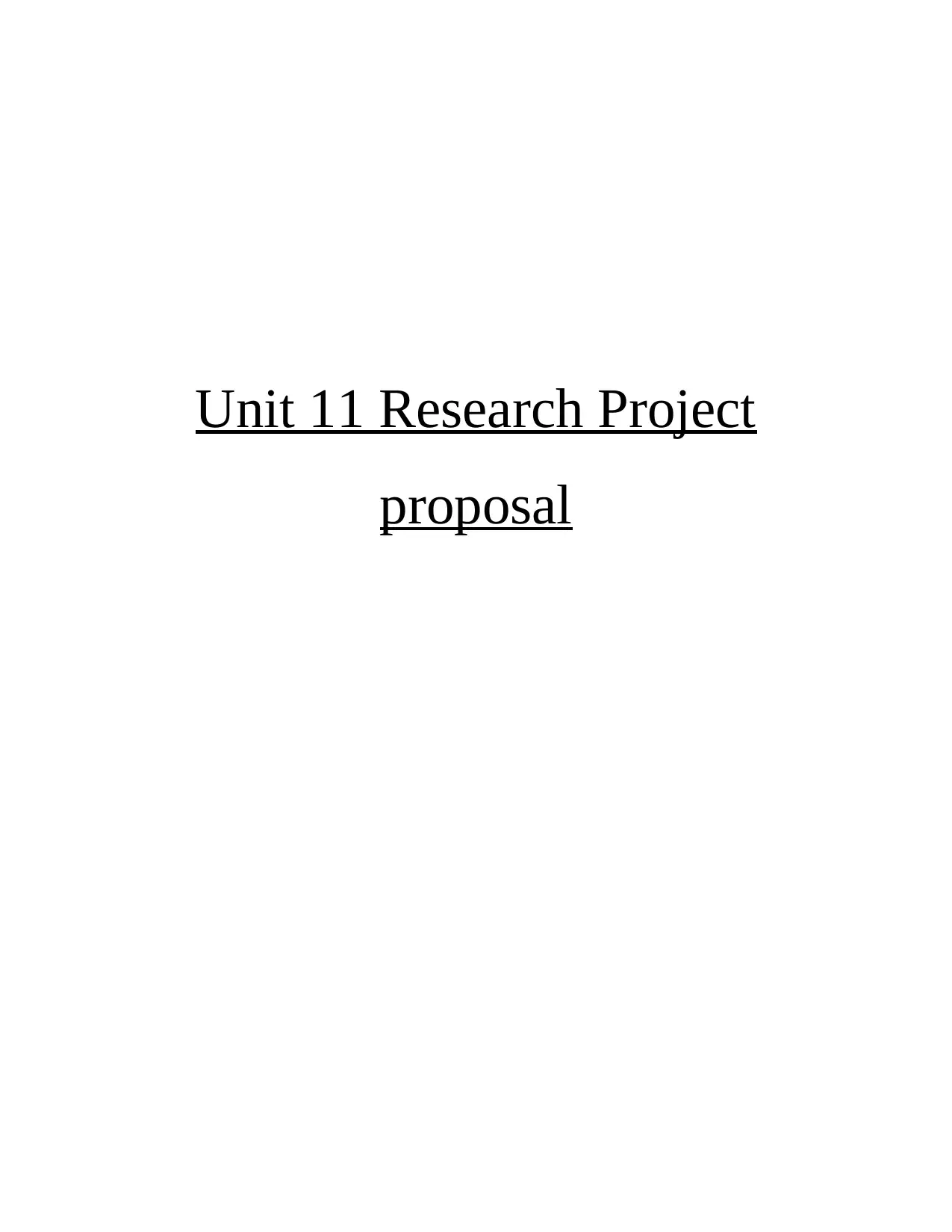
Unit 11 Research Project
proposal
proposal
Paraphrase This Document
Need a fresh take? Get an instant paraphrase of this document with our AI Paraphraser
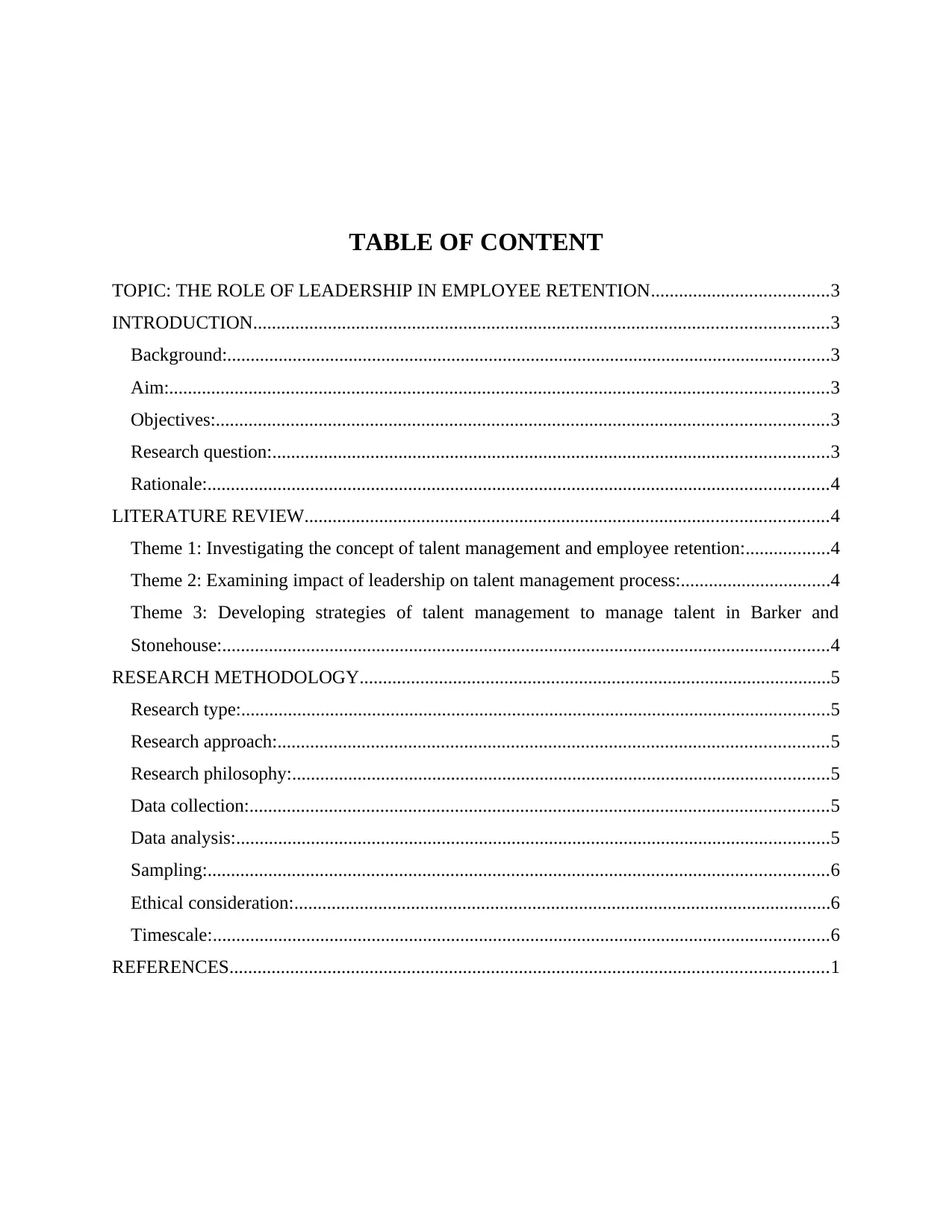
TABLE OF CONTENT
TOPIC: THE ROLE OF LEADERSHIP IN EMPLOYEE RETENTION......................................3
INTRODUCTION...........................................................................................................................3
Background:.................................................................................................................................3
Aim:.............................................................................................................................................3
Objectives:...................................................................................................................................3
Research question:.......................................................................................................................3
Rationale:.....................................................................................................................................4
LITERATURE REVIEW................................................................................................................4
Theme 1: Investigating the concept of talent management and employee retention:..................4
Theme 2: Examining impact of leadership on talent management process:................................4
Theme 3: Developing strategies of talent management to manage talent in Barker and
Stonehouse:..................................................................................................................................4
RESEARCH METHODOLOGY.....................................................................................................5
Research type:..............................................................................................................................5
Research approach:......................................................................................................................5
Research philosophy:...................................................................................................................5
Data collection:............................................................................................................................5
Data analysis:...............................................................................................................................5
Sampling:.....................................................................................................................................6
Ethical consideration:...................................................................................................................6
Timescale:....................................................................................................................................6
REFERENCES................................................................................................................................1
TOPIC: THE ROLE OF LEADERSHIP IN EMPLOYEE RETENTION......................................3
INTRODUCTION...........................................................................................................................3
Background:.................................................................................................................................3
Aim:.............................................................................................................................................3
Objectives:...................................................................................................................................3
Research question:.......................................................................................................................3
Rationale:.....................................................................................................................................4
LITERATURE REVIEW................................................................................................................4
Theme 1: Investigating the concept of talent management and employee retention:..................4
Theme 2: Examining impact of leadership on talent management process:................................4
Theme 3: Developing strategies of talent management to manage talent in Barker and
Stonehouse:..................................................................................................................................4
RESEARCH METHODOLOGY.....................................................................................................5
Research type:..............................................................................................................................5
Research approach:......................................................................................................................5
Research philosophy:...................................................................................................................5
Data collection:............................................................................................................................5
Data analysis:...............................................................................................................................5
Sampling:.....................................................................................................................................6
Ethical consideration:...................................................................................................................6
Timescale:....................................................................................................................................6
REFERENCES................................................................................................................................1
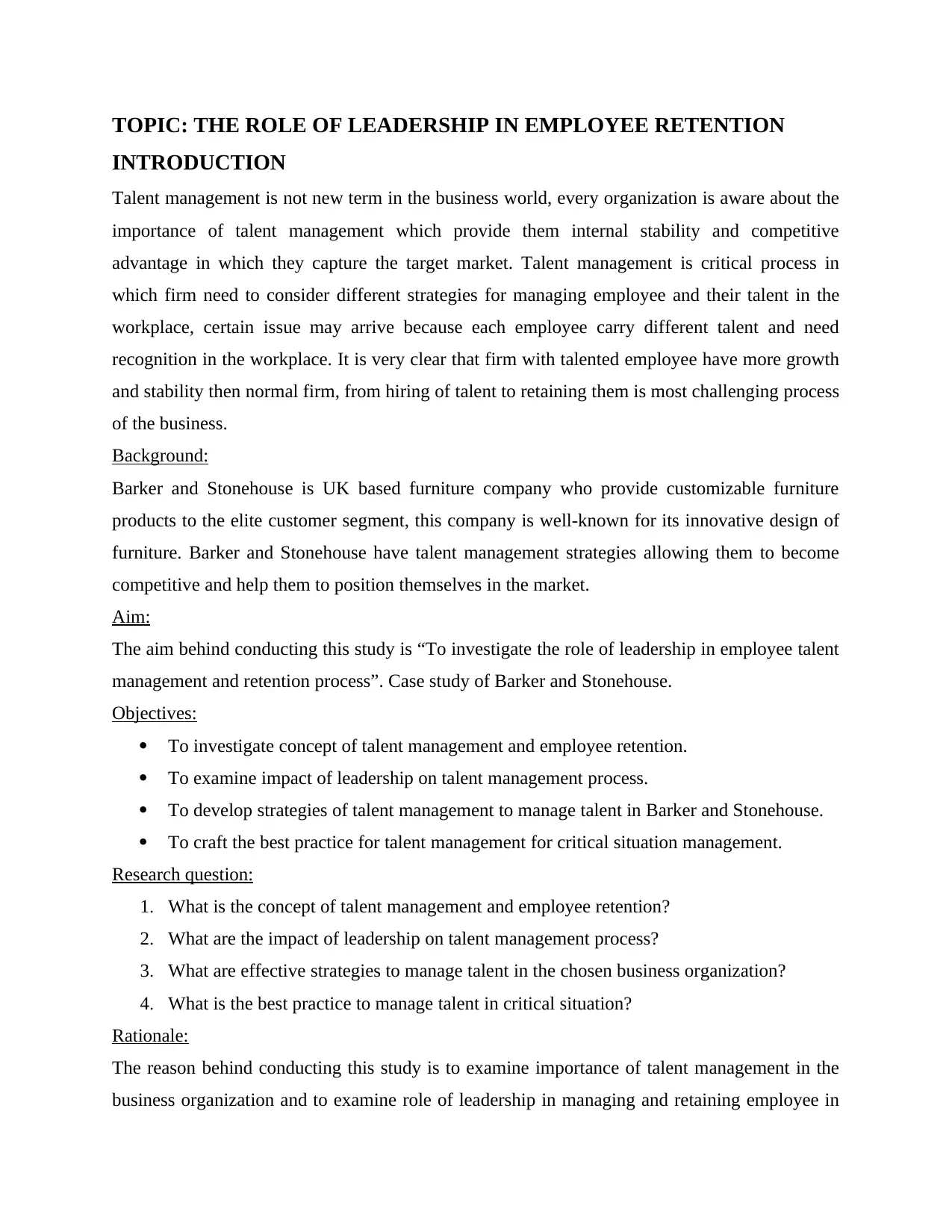
TOPIC: THE ROLE OF LEADERSHIP IN EMPLOYEE RETENTION
INTRODUCTION
Talent management is not new term in the business world, every organization is aware about the
importance of talent management which provide them internal stability and competitive
advantage in which they capture the target market. Talent management is critical process in
which firm need to consider different strategies for managing employee and their talent in the
workplace, certain issue may arrive because each employee carry different talent and need
recognition in the workplace. It is very clear that firm with talented employee have more growth
and stability then normal firm, from hiring of talent to retaining them is most challenging process
of the business.
Background:
Barker and Stonehouse is UK based furniture company who provide customizable furniture
products to the elite customer segment, this company is well-known for its innovative design of
furniture. Barker and Stonehouse have talent management strategies allowing them to become
competitive and help them to position themselves in the market.
Aim:
The aim behind conducting this study is “To investigate the role of leadership in employee talent
management and retention process”. Case study of Barker and Stonehouse.
Objectives:
To investigate concept of talent management and employee retention.
To examine impact of leadership on talent management process.
To develop strategies of talent management to manage talent in Barker and Stonehouse.
To craft the best practice for talent management for critical situation management.
Research question:
1. What is the concept of talent management and employee retention?
2. What are the impact of leadership on talent management process?
3. What are effective strategies to manage talent in the chosen business organization?
4. What is the best practice to manage talent in critical situation?
Rationale:
The reason behind conducting this study is to examine importance of talent management in the
business organization and to examine role of leadership in managing and retaining employee in
INTRODUCTION
Talent management is not new term in the business world, every organization is aware about the
importance of talent management which provide them internal stability and competitive
advantage in which they capture the target market. Talent management is critical process in
which firm need to consider different strategies for managing employee and their talent in the
workplace, certain issue may arrive because each employee carry different talent and need
recognition in the workplace. It is very clear that firm with talented employee have more growth
and stability then normal firm, from hiring of talent to retaining them is most challenging process
of the business.
Background:
Barker and Stonehouse is UK based furniture company who provide customizable furniture
products to the elite customer segment, this company is well-known for its innovative design of
furniture. Barker and Stonehouse have talent management strategies allowing them to become
competitive and help them to position themselves in the market.
Aim:
The aim behind conducting this study is “To investigate the role of leadership in employee talent
management and retention process”. Case study of Barker and Stonehouse.
Objectives:
To investigate concept of talent management and employee retention.
To examine impact of leadership on talent management process.
To develop strategies of talent management to manage talent in Barker and Stonehouse.
To craft the best practice for talent management for critical situation management.
Research question:
1. What is the concept of talent management and employee retention?
2. What are the impact of leadership on talent management process?
3. What are effective strategies to manage talent in the chosen business organization?
4. What is the best practice to manage talent in critical situation?
Rationale:
The reason behind conducting this study is to examine importance of talent management in the
business organization and to examine role of leadership in managing and retaining employee in
⊘ This is a preview!⊘
Do you want full access?
Subscribe today to unlock all pages.

Trusted by 1+ million students worldwide
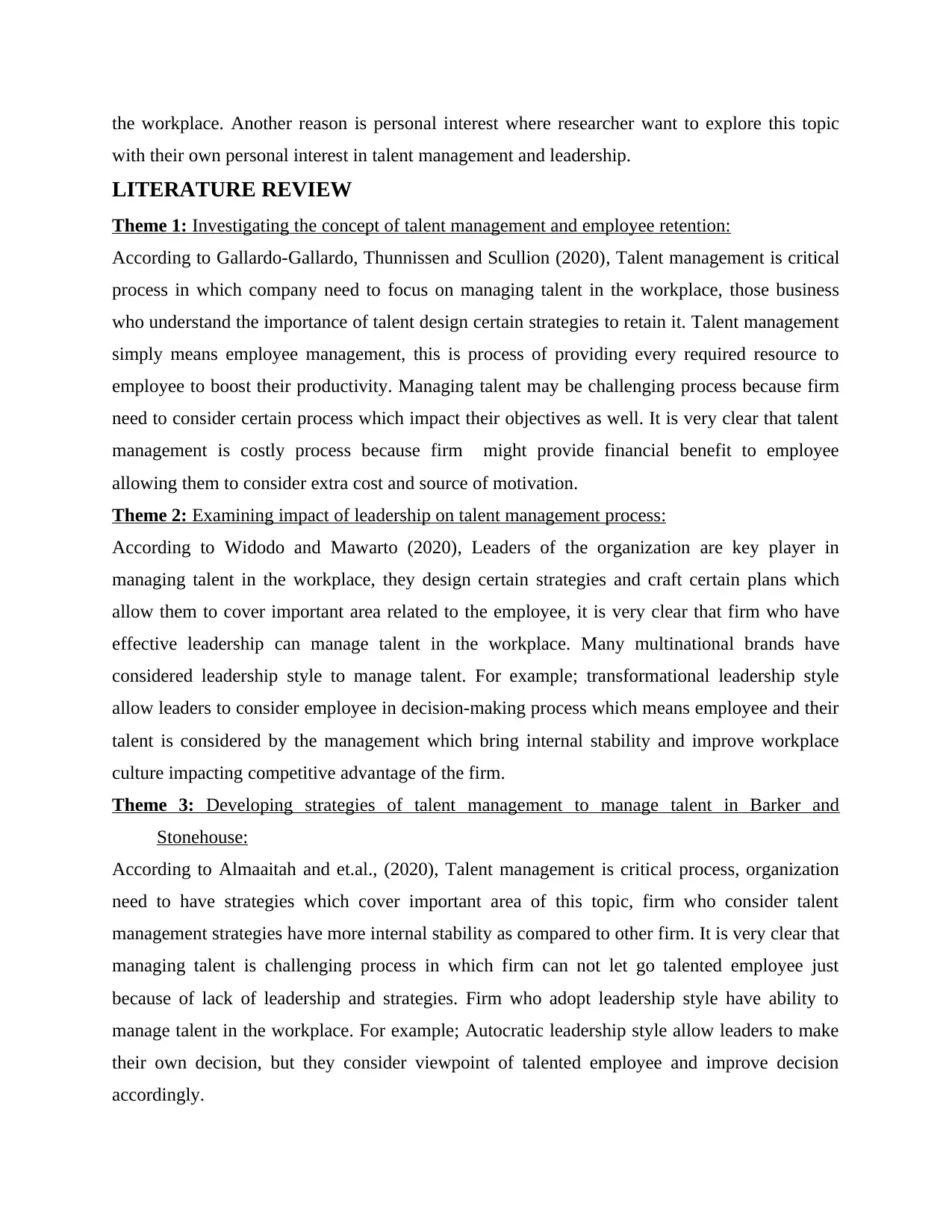
the workplace. Another reason is personal interest where researcher want to explore this topic
with their own personal interest in talent management and leadership.
LITERATURE REVIEW
Theme 1: Investigating the concept of talent management and employee retention:
According to Gallardo-Gallardo, Thunnissen and Scullion (2020), Talent management is critical
process in which company need to focus on managing talent in the workplace, those business
who understand the importance of talent design certain strategies to retain it. Talent management
simply means employee management, this is process of providing every required resource to
employee to boost their productivity. Managing talent may be challenging process because firm
need to consider certain process which impact their objectives as well. It is very clear that talent
management is costly process because firm might provide financial benefit to employee
allowing them to consider extra cost and source of motivation.
Theme 2: Examining impact of leadership on talent management process:
According to Widodo and Mawarto (2020), Leaders of the organization are key player in
managing talent in the workplace, they design certain strategies and craft certain plans which
allow them to cover important area related to the employee, it is very clear that firm who have
effective leadership can manage talent in the workplace. Many multinational brands have
considered leadership style to manage talent. For example; transformational leadership style
allow leaders to consider employee in decision-making process which means employee and their
talent is considered by the management which bring internal stability and improve workplace
culture impacting competitive advantage of the firm.
Theme 3: Developing strategies of talent management to manage talent in Barker and
Stonehouse:
According to Almaaitah and et.al., (2020), Talent management is critical process, organization
need to have strategies which cover important area of this topic, firm who consider talent
management strategies have more internal stability as compared to other firm. It is very clear that
managing talent is challenging process in which firm can not let go talented employee just
because of lack of leadership and strategies. Firm who adopt leadership style have ability to
manage talent in the workplace. For example; Autocratic leadership style allow leaders to make
their own decision, but they consider viewpoint of talented employee and improve decision
accordingly.
with their own personal interest in talent management and leadership.
LITERATURE REVIEW
Theme 1: Investigating the concept of talent management and employee retention:
According to Gallardo-Gallardo, Thunnissen and Scullion (2020), Talent management is critical
process in which company need to focus on managing talent in the workplace, those business
who understand the importance of talent design certain strategies to retain it. Talent management
simply means employee management, this is process of providing every required resource to
employee to boost their productivity. Managing talent may be challenging process because firm
need to consider certain process which impact their objectives as well. It is very clear that talent
management is costly process because firm might provide financial benefit to employee
allowing them to consider extra cost and source of motivation.
Theme 2: Examining impact of leadership on talent management process:
According to Widodo and Mawarto (2020), Leaders of the organization are key player in
managing talent in the workplace, they design certain strategies and craft certain plans which
allow them to cover important area related to the employee, it is very clear that firm who have
effective leadership can manage talent in the workplace. Many multinational brands have
considered leadership style to manage talent. For example; transformational leadership style
allow leaders to consider employee in decision-making process which means employee and their
talent is considered by the management which bring internal stability and improve workplace
culture impacting competitive advantage of the firm.
Theme 3: Developing strategies of talent management to manage talent in Barker and
Stonehouse:
According to Almaaitah and et.al., (2020), Talent management is critical process, organization
need to have strategies which cover important area of this topic, firm who consider talent
management strategies have more internal stability as compared to other firm. It is very clear that
managing talent is challenging process in which firm can not let go talented employee just
because of lack of leadership and strategies. Firm who adopt leadership style have ability to
manage talent in the workplace. For example; Autocratic leadership style allow leaders to make
their own decision, but they consider viewpoint of talented employee and improve decision
accordingly.
Paraphrase This Document
Need a fresh take? Get an instant paraphrase of this document with our AI Paraphraser
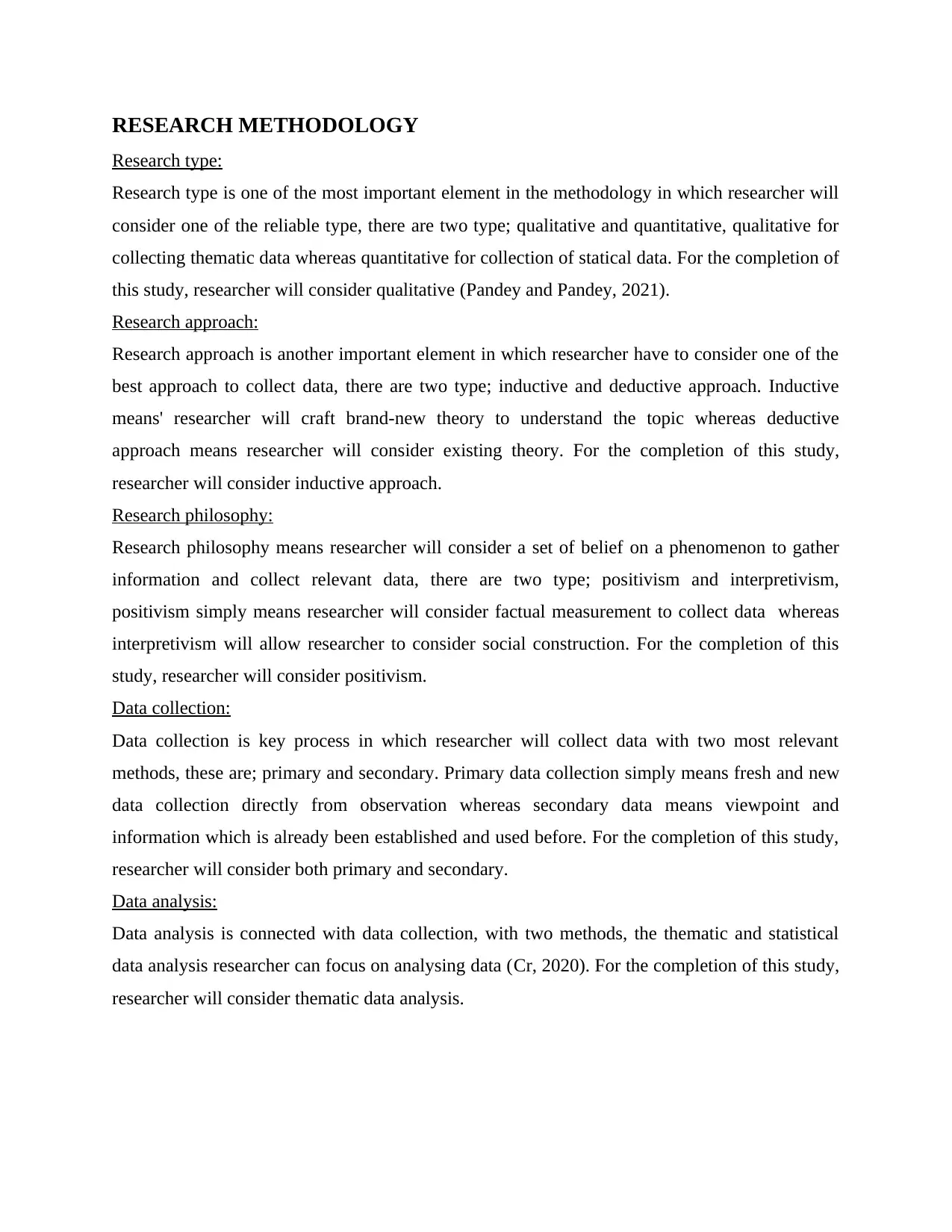
RESEARCH METHODOLOGY
Research type:
Research type is one of the most important element in the methodology in which researcher will
consider one of the reliable type, there are two type; qualitative and quantitative, qualitative for
collecting thematic data whereas quantitative for collection of statical data. For the completion of
this study, researcher will consider qualitative (Pandey and Pandey, 2021).
Research approach:
Research approach is another important element in which researcher have to consider one of the
best approach to collect data, there are two type; inductive and deductive approach. Inductive
means' researcher will craft brand-new theory to understand the topic whereas deductive
approach means researcher will consider existing theory. For the completion of this study,
researcher will consider inductive approach.
Research philosophy:
Research philosophy means researcher will consider a set of belief on a phenomenon to gather
information and collect relevant data, there are two type; positivism and interpretivism,
positivism simply means researcher will consider factual measurement to collect data whereas
interpretivism will allow researcher to consider social construction. For the completion of this
study, researcher will consider positivism.
Data collection:
Data collection is key process in which researcher will collect data with two most relevant
methods, these are; primary and secondary. Primary data collection simply means fresh and new
data collection directly from observation whereas secondary data means viewpoint and
information which is already been established and used before. For the completion of this study,
researcher will consider both primary and secondary.
Data analysis:
Data analysis is connected with data collection, with two methods, the thematic and statistical
data analysis researcher can focus on analysing data (Cr, 2020). For the completion of this study,
researcher will consider thematic data analysis.
Research type:
Research type is one of the most important element in the methodology in which researcher will
consider one of the reliable type, there are two type; qualitative and quantitative, qualitative for
collecting thematic data whereas quantitative for collection of statical data. For the completion of
this study, researcher will consider qualitative (Pandey and Pandey, 2021).
Research approach:
Research approach is another important element in which researcher have to consider one of the
best approach to collect data, there are two type; inductive and deductive approach. Inductive
means' researcher will craft brand-new theory to understand the topic whereas deductive
approach means researcher will consider existing theory. For the completion of this study,
researcher will consider inductive approach.
Research philosophy:
Research philosophy means researcher will consider a set of belief on a phenomenon to gather
information and collect relevant data, there are two type; positivism and interpretivism,
positivism simply means researcher will consider factual measurement to collect data whereas
interpretivism will allow researcher to consider social construction. For the completion of this
study, researcher will consider positivism.
Data collection:
Data collection is key process in which researcher will collect data with two most relevant
methods, these are; primary and secondary. Primary data collection simply means fresh and new
data collection directly from observation whereas secondary data means viewpoint and
information which is already been established and used before. For the completion of this study,
researcher will consider both primary and secondary.
Data analysis:
Data analysis is connected with data collection, with two methods, the thematic and statistical
data analysis researcher can focus on analysing data (Cr, 2020). For the completion of this study,
researcher will consider thematic data analysis.
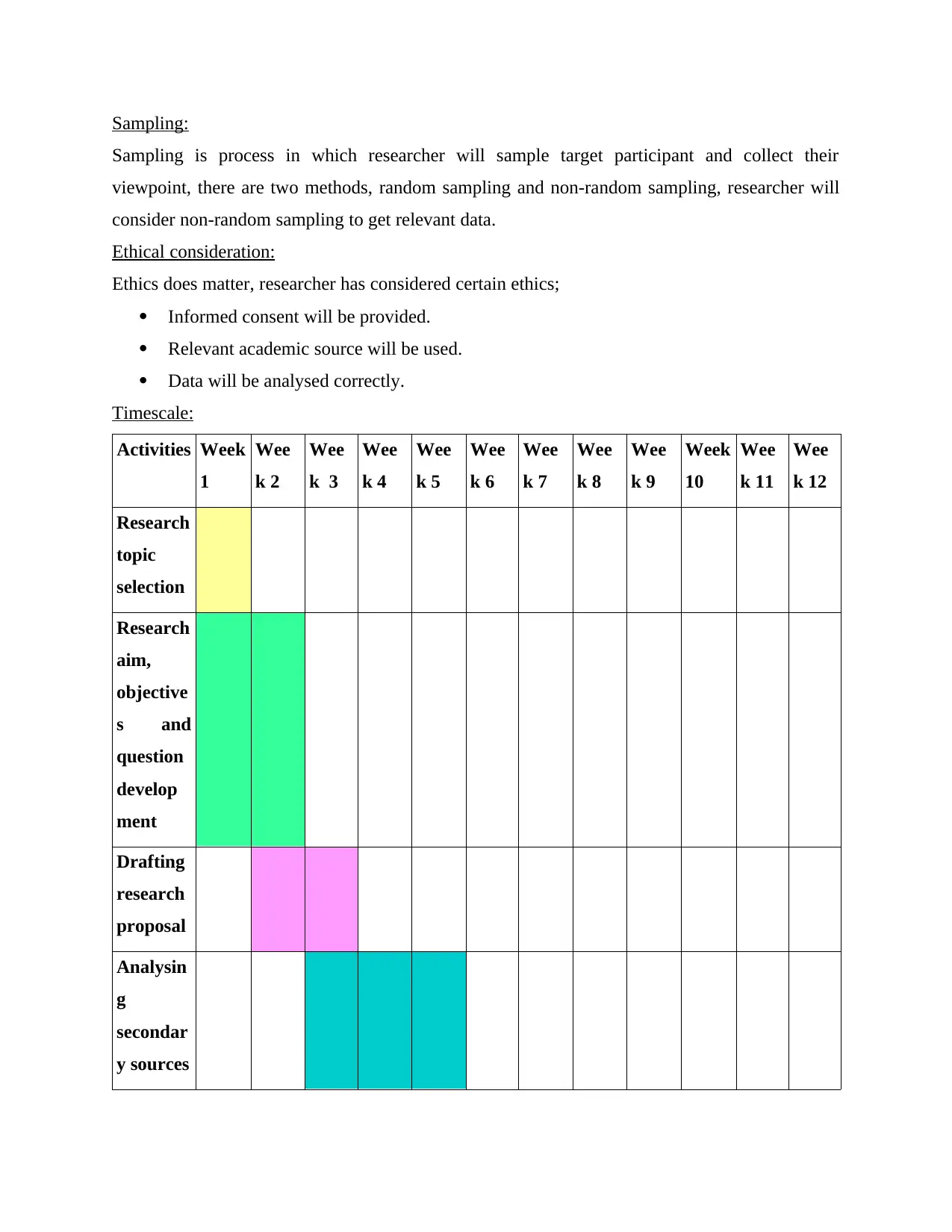
Sampling:
Sampling is process in which researcher will sample target participant and collect their
viewpoint, there are two methods, random sampling and non-random sampling, researcher will
consider non-random sampling to get relevant data.
Ethical consideration:
Ethics does matter, researcher has considered certain ethics;
Informed consent will be provided.
Relevant academic source will be used.
Data will be analysed correctly.
Timescale:
Activities Week
1
Wee
k 2
Wee
k 3
Wee
k 4
Wee
k 5
Wee
k 6
Wee
k 7
Wee
k 8
Wee
k 9
Week
10
Wee
k 11
Wee
k 12
Research
topic
selection
Research
aim,
objective
s and
question
develop
ment
Drafting
research
proposal
Analysin
g
secondar
y sources
Sampling is process in which researcher will sample target participant and collect their
viewpoint, there are two methods, random sampling and non-random sampling, researcher will
consider non-random sampling to get relevant data.
Ethical consideration:
Ethics does matter, researcher has considered certain ethics;
Informed consent will be provided.
Relevant academic source will be used.
Data will be analysed correctly.
Timescale:
Activities Week
1
Wee
k 2
Wee
k 3
Wee
k 4
Wee
k 5
Wee
k 6
Wee
k 7
Wee
k 8
Wee
k 9
Week
10
Wee
k 11
Wee
k 12
Research
topic
selection
Research
aim,
objective
s and
question
develop
ment
Drafting
research
proposal
Analysin
g
secondar
y sources
⊘ This is a preview!⊘
Do you want full access?
Subscribe today to unlock all pages.

Trusted by 1+ million students worldwide
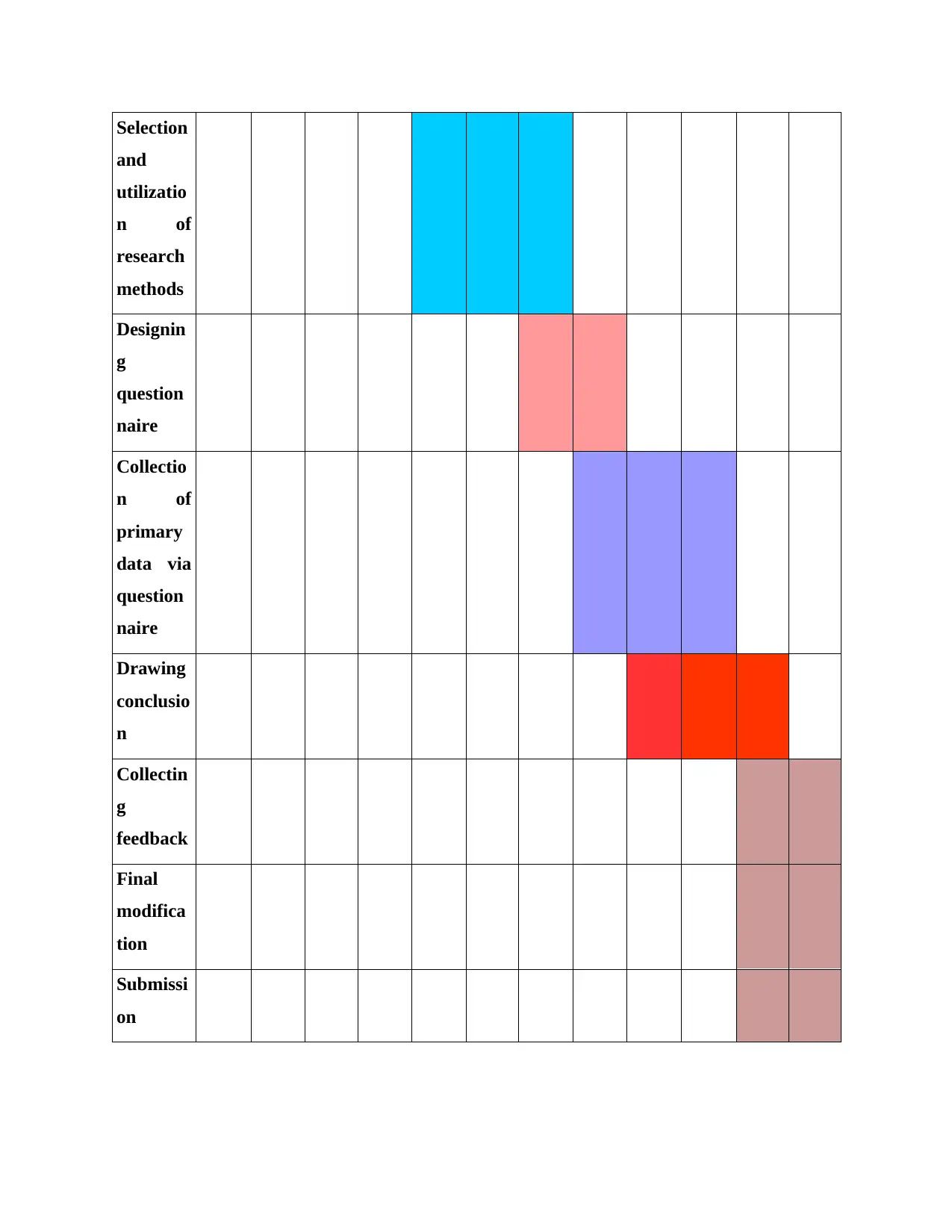
Selection
and
utilizatio
n of
research
methods
Designin
g
question
naire
Collectio
n of
primary
data via
question
naire
Drawing
conclusio
n
Collectin
g
feedback
Final
modifica
tion
Submissi
on
and
utilizatio
n of
research
methods
Designin
g
question
naire
Collectio
n of
primary
data via
question
naire
Drawing
conclusio
n
Collectin
g
feedback
Final
modifica
tion
Submissi
on
Paraphrase This Document
Need a fresh take? Get an instant paraphrase of this document with our AI Paraphraser
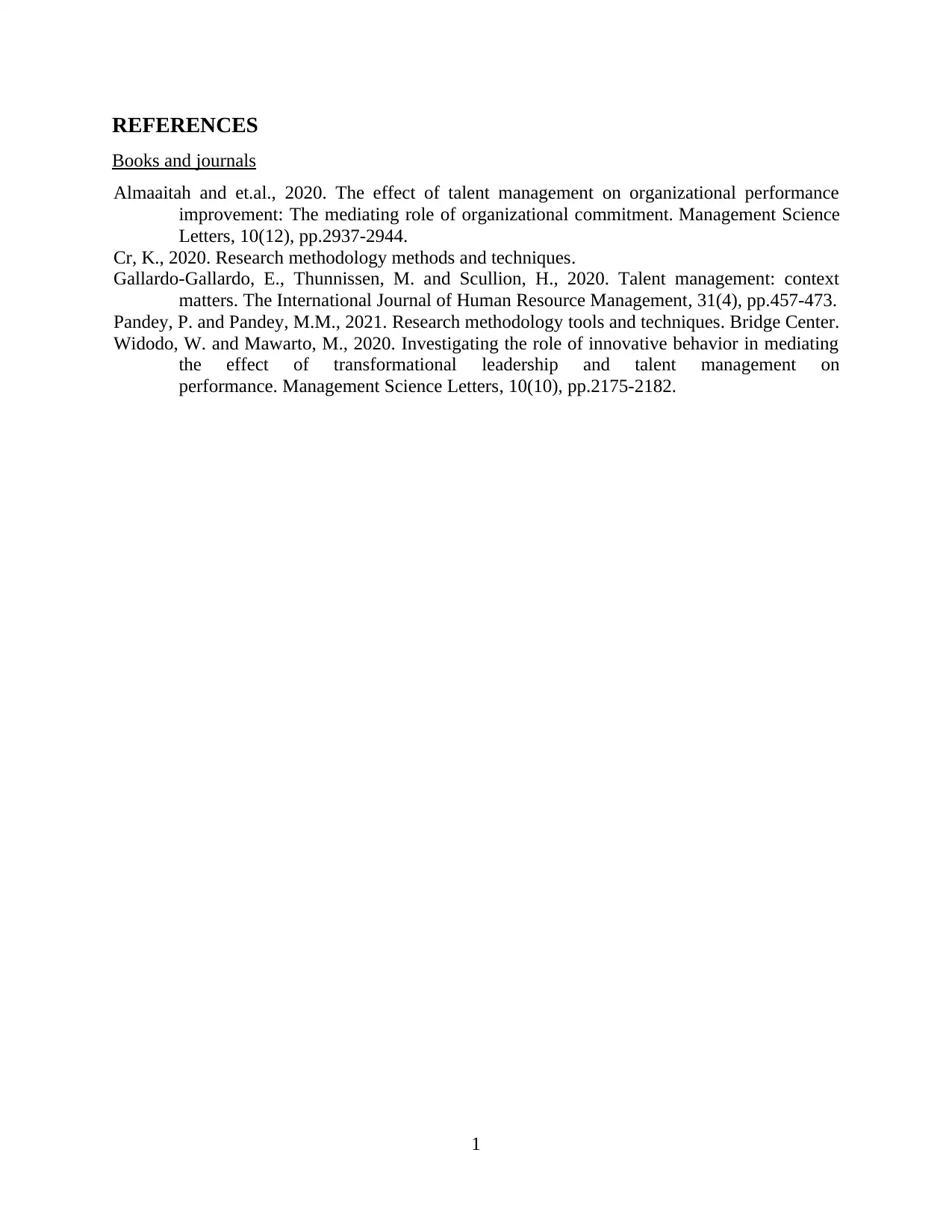
REFERENCES
Books and journals
Almaaitah and et.al., 2020. The effect of talent management on organizational performance
improvement: The mediating role of organizational commitment. Management Science
Letters, 10(12), pp.2937-2944.
Cr, K., 2020. Research methodology methods and techniques.
Gallardo-Gallardo, E., Thunnissen, M. and Scullion, H., 2020. Talent management: context
matters. The International Journal of Human Resource Management, 31(4), pp.457-473.
Pandey, P. and Pandey, M.M., 2021. Research methodology tools and techniques. Bridge Center.
Widodo, W. and Mawarto, M., 2020. Investigating the role of innovative behavior in mediating
the effect of transformational leadership and talent management on
performance. Management Science Letters, 10(10), pp.2175-2182.
1
Books and journals
Almaaitah and et.al., 2020. The effect of talent management on organizational performance
improvement: The mediating role of organizational commitment. Management Science
Letters, 10(12), pp.2937-2944.
Cr, K., 2020. Research methodology methods and techniques.
Gallardo-Gallardo, E., Thunnissen, M. and Scullion, H., 2020. Talent management: context
matters. The International Journal of Human Resource Management, 31(4), pp.457-473.
Pandey, P. and Pandey, M.M., 2021. Research methodology tools and techniques. Bridge Center.
Widodo, W. and Mawarto, M., 2020. Investigating the role of innovative behavior in mediating
the effect of transformational leadership and talent management on
performance. Management Science Letters, 10(10), pp.2175-2182.
1
1 out of 8
Related Documents
Your All-in-One AI-Powered Toolkit for Academic Success.
+13062052269
info@desklib.com
Available 24*7 on WhatsApp / Email
![[object Object]](/_next/static/media/star-bottom.7253800d.svg)
Unlock your academic potential
Copyright © 2020–2026 A2Z Services. All Rights Reserved. Developed and managed by ZUCOL.




